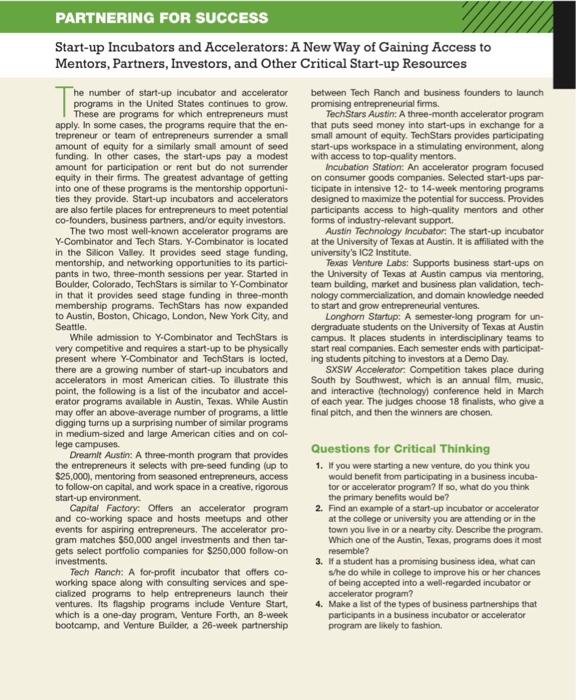Answered step by step
Verified Expert Solution
Question
1 Approved Answer
PARTNERING FOR SUCCESS Start-up Incubators and Accelerators: A New Way of Gaining Access to Mentors, Partners, Investors, and Other Critical Start-up Resources The number

PARTNERING FOR SUCCESS Start-up Incubators and Accelerators: A New Way of Gaining Access to Mentors, Partners, Investors, and Other Critical Start-up Resources The number of start-up incubator and accelerator programs in the United States continues to grow. apply. In some cases, the programs require that the en- trepreneur or team of entrepreneurs surrender a small amount of equity for a similarly small amount of seed funding. In other cases, the start-ups pay a modest amount for participation or rent but do not surrender equity in their firms. The greatest advantage of getting into one of these programs is the mentorship opportuni- ties they provide. Start-up incubators and accelerators are also fertile places for entrepreneurs to meet potential co-founders, business partners, and/or equity investors. The two most ell-known accelerator programs are Y-Combinator and Tech Stars. Y-Combinator is located in the Silicon Valley. It provides seed stage funding. mentorship, and networking opportunities to its partici- pants in two, three-month sessions per year. Started in Boulder, Colorado, TechStars is similar to Y-Combinator in that it provides seed stage funding in three-month membership programs. TechStars has now expanded to Austin, Boston, Chicago, London, New York City, and Seattle. While admission to Y-Combinator and TechStars is very competitive and requires a start-up to be physically present where Y-Combinator and TechStars is locted, there are a growing number of start-up incubators and accelerators in most American cities. To illustrate this point, the following is a list of the incubator and accel- erator programs available in Austin, Texas. While Austin may offer an above-average number of programs, a little digging turns up a surprising number of similar programs in medium-sized and large American cities and on col- lege campuses. Dreamit Austin: A three-month program that provides the entrepreneurs it selects with pre-seed funding (up to $25,000), mentoring from seasoned entrepreneurs, access to follow-on capital, and work space in a creative, rigorous start-up environment. Capital Factory: Offers an accelerator program and co-working space and hosts meetups and other events for aspiring entrepreneurs. The accelerator pro- gram matches $50,000 angel investments and then tar- gets select portfolio companies for $250,000 follow-on investments. Tech Ranch: A for-profit incubator that offers co- working space along with consulting services and spe- cialized programs to help entrepreneurs launch their ventures. Its flagship programs include Venture Start, which is a one-day program, Venture Forth, an 8-week bootcamp, and Venture Builder, a 26-week partnership between Tech Ranch and business founders to launch promising entrepreneurial firms. TechStars Austin: A three-month accelerator program that puts seed money into start-ups in exchange for a small amount of equity. TechStars provides participating start-ups workspace in a stimulating environment, along with access to top-quality mentors. Incubation Station: An accelerator program focused on consumer goods companies. Selected start-ups par- ticipate in intensive 12- to 14-week mentoring programs designed to maximize the potential for success. Provides participants access to high-quality mentors and other forms of industry-relevant support. Austin Technology Incubator: The start-up incubator at the University of Texas at Austin. It is affiliated with the university's IC2 Institute. Texas Venture Labs: Supports business start-ups on the University of Texas at Austin campus via mentoring. team building, market and business plan validation, tech- nology commercialization, and domain knowledge needed to start and grow entrepreneurial ventures. Longhorn Startup: A semester-long program for un- dergraduate students on the University of Texas at Austin campus. It places students in interdisciplinary teams to start real companies. Each semester ends with participat- ing students pitching to investors at a Demo Day. SXSW Accelerator. Competition takes place during South by Southwest, which is an annual film, music, and interactive (technology) conference held in March of each year. The judges choose 18 finalists, who give a final pitch, and then the winners are chosen. Questions for Critical Thinking 1. If you were starting a new venture, do you think you would benefit from participating in a business incuba- tor or accelerator program? If so, what do you think the primary benefits would be? 2. Find an example of a start-up incubator or accelerator at the college or university you are attending or in the town you live in or a nearby city. Describe the program. Which one of the Austin, Texas, programs does it most resemble? 3. If a student has a promising business idea, what can s/he do while in college to improve his or her chances of being accepted into a well-regarded incubator or accelerator program? 4. Make a list of the types of business partnerships that participants in a business incubator or accelerator program are likely to fashion.
Step by Step Solution
★★★★★
3.42 Rating (152 Votes )
There are 3 Steps involved in it
Step: 1
1 The greatest advantage of getting into these programs is the mentorship opportunity they provide S...
Get Instant Access to Expert-Tailored Solutions
See step-by-step solutions with expert insights and AI powered tools for academic success
Step: 2

Step: 3

Ace Your Homework with AI
Get the answers you need in no time with our AI-driven, step-by-step assistance
Get Started


